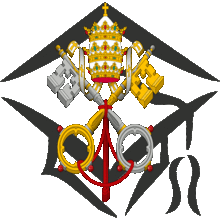DolceVita Institute of Technology
 | |
Former name | Yousef Yuhanna Meletios Macarios III Zaim Institute of Technology |
|---|---|
| Type | Private |
| Established | 1994 |
| Students | 725 |
| Undergraduates | 512 |
| Postgraduates | 213 |
| Location |
Rome, Vatican City 41°54′13″N 12°27′28″E / 41.903591°N 12.457678°E |
| Language | English, Italian and Latin |
| Website |
www |
The DolceVita Institute of Technology, often referred to as DolceVitaTech, is a private, non-profit, multilingual, non-denominational,[1] educational institution located within the Leonine Wall of the Vatican City[2] and specialized in Information and communications technology.
History and programs
The institute was founded in 1994[2] and started to offer a Baccalaureate (analogous to a BSc made up of 180 ECTS) and a Licentiate (analogous to a MSc made up of 120 ECTS) in Computing and IT, as well as a Baccalaureate (analogous to a BA made up of 180 ECTS) in Communication and Italian language. As soon as the Vatican City State joined the Bologna process in 2003,[3][4] the DolceVita Institute of Technology reorganized its programs so that they could comply with the new European educational framework, and new graduate and undergraduate curricula have been added. Furthermore, cutting-edge distance learning technology tools were adopted, such as the Second Life virtual world.[5]
In the Vatican City area, DolceVitaTech remains the first and only institution in the ICT sector.[5]
Former name
The institution was also formerly known as Yousef Yuhanna Meletios Macarios III Zaim Institute of Technology. Macarios III was an important representative of Eastern Christianity. His role in the reconciliation between divided churches has been recognized and valued by the Holy See,[6] and the name of the institute mentions Macarios precisely because of the non-denominational character of the institution.
Humanitarian causes
As a nonprofit institution, DolceVitaTech has been committed to helping the Saharawi people in the Sahrawi Arab Democratic Republic.
New partnerships[7] have been established with accredited institutions in Belize, Costa Rica and Dominican Republic.[8]
Full scholarships for international students in Italy
In 2016, 2017 and 2018, the institute will be offering full scholarships for international students in Italy/Europe who have Italian citizenship in addition to their own, and are permanent residents — or citizens — of one of these countries: United States of America, Canada, Antigua and Barbuda, Bahamas, Barbados, Belize, Costa Rica, Dominican Republic, El Salvador, Grenada, Guatemala, Haiti, Honduras, Mexico, Nicaragua, Panama, St. Kitts and Nevis.[9] Therefore, the scholarships — both college/undergraduate and graduate/PhD — are also available to Italian-American and Italian-Canadian students willing to study in Rome, Italy.
Accreditation
The institute only partners with other accredited institutions and the double degree programs are always accredited in the countries where they are offered.[7]
All the higher education programs are validated by the Vatican authorities, on the basis of a memorandum of co-operation which is fully compliant with the implementation of the Bologna Process.[7][5]
See also
References
| Wikisource has original text related to this article: |
- ↑ Archivio delle leggi dello Stato della Città del Vaticano [Archive of the Laws of Vatican City State] (in Italian), XVII, Vatican City: Vatican Publishing House, 2005, p. 561
- 1 2 Archivio delle leggi dello Stato della Città del Vaticano [Archive of the Laws of Vatican City State] (in Italian), XXIV, Vatican City: Vatican Publishing House, 1994, p. 372
- ↑ "Higher Education and Research: Bologna for Pedestrians". Council of Europe. Retrieved 6 October 2014.
- ↑ "Il processo di Bologna" [The Bologna process] (PDF) (in Italian). CIMEA. Retrieved 6 October 2014.
- 1 2 3 "DolceVita Institute of Technology". Retrieved 6 October 2014.
- ↑ Davies, Brian (20 January 2008). "The Crusades, the Ottomans, Rome and us". The Catholic Weekly. Sidney. Retrieved 6 October 2014.
- 1 2 3 "DolceVita Institute of Technology to offer new degrees". Retrieved 10 May 2016.
- ↑ "Laurea triennale e magistrale online" (in Italian). Retrieved 6 May 2016.
- ↑ "Full scholarships Italy citizenship". Retrieved 5 November 2015.